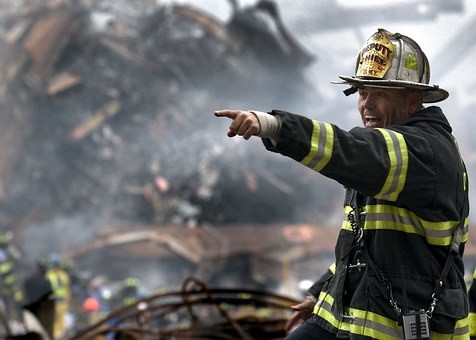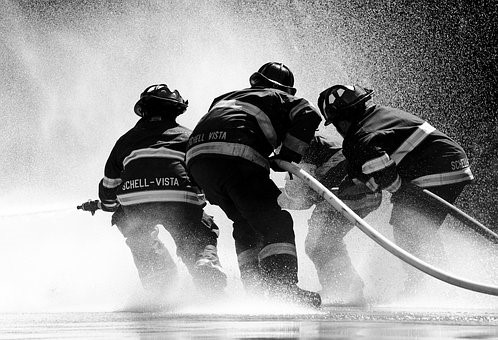Leadership is about control, right? Boldly standing in front of the troops pointing forward with a clear vision and direction? That’s what I thought when I first started my business.

One phone call changed all that.
I was in my late twenties, and I’d only been a business owner for two years. We had 8 employees and all of them were younger than me. Translation: none of us really knew what we were doing. I chose to deal with our shared inexperience by trying to keep tabs on everything that was going on in our small, growing, company. I mean everything.
One service we provided was event planning, and part of that service was onsite staffing for client conferences. On this day, we had two staff supporting a 3-day event at a resort property in Northern Minnesota hosting over 300 medical management professionals.
As was my approach at the time, I required regular telephone check-ins from our event staff. During the calls I would bother staff with my stress induced, unhelpful questions.

Here Come the Dumb Questions
“How are the food supplies holding out?”
“Fine.”
“How are things going at the registration desk?”
“OK.”
“Any complaints?”
“Nothing we couldn’t handle.”
Not being experienced with meetings and events myself, my management strategy was to ask trivial questions until I convinced myself that I had done my job as “leader.” Once my anxiety was purged, I would let staff hang-up and get back to doing their jobs.
“How many walk-in attendees showed up?”
“About 20.”
“How are staff . . . “
“Hold on. The fire alarm’s going off.”
Dial Tone
And then I heard nothing.
From anyone.
For two hours.
(Let me remind younger readers that this was a time when most phones were still connected to wires. There was no expectation for a quick text or IM, and my employees were not going to live-stream their escape from the burning building. Staff were going to have to deal with the situation and then “find a phone” to call back to the office.)

I sat at my desk in silent, petrified, melt-down mode.
I’d started the day believing I was in control. It was my business. I knew all the details. If I kept juggling fast enough, we would be alright. I believed that the future growth and success of my company was in my hands.
Sitting at my desk I realized that my company’s ability to deal with this crisis had nothing to do with “my hands”, or my leadership. In fact, it had very little to do with me at all.
As a “leader” in my growing company, I clearly had lost control. It was up to others. Sitting at my desk I realized I really had impact in only one area.
I Got to Pick the People
That’s where my influence started and mostly ended.
I got to build the team. Almost everything else after that was going to be up to them. They would engage, implement, and adjust to circumstances on their own. I got to determine who would be there representing the business. All I really got to do was choose the people.
And on this day my choice made the difference – because 12 months earlier I had hired Maria, and she was on site managing the event that day.
As it turns out, a hotel guest (yep, one of our convention attendees) was taking a smoke break on their hotel room balcony. They flipped their cigarette off the balcony, it lodged in the cedar shake roof, smoldered and ignited.

The fire wasn’t massive, but it was large enough to merit a facility wide evacuation – and coverage in the state-wide papers and TV news.
I honestly don’t remember the details that Maria shared when she finally called to report what had happened. I do remember she was excited, but in control. She probably gave a brief description of what happened, and how staff had responded. I probably felt compelled to ask a few stupid questions. Then she probably hung up and went back to work.
Maria managed the crisis, not me. She provided the leadership, not me.
It was about her, not me. I needed to focus on building a team. I needed to change how I did my job.

Starting to Change
Take event management. Clearly, I was bad at it. All I saw at client events were the 7 things going slightly wrong – my staff rightly saw the 993 things going right, while they effectively managed the 7 things going wrong. They adjusted and continued to move forward. I panicked. But as I panicked, I kept them from doing their jobs.
It was time for a change, so not too long after the fire I banned myself from attending any client events (technically staff asked me not to attend anymore client events, but I wisely agreed). I also separated myself from any active management of the meetings & events department. No more phone calls with my stupid questions.
I started to change what kind of leader I was.
I’d love to tell you that I learned the lesson fully that day. I didn’t. My trust in the team evolved over time. But I know that day cracked the wall of belief I’d built up about what my role as “leader” was and how I could provide real value to my business. Sure, I was bad at event management; however, I was pretty good at picking people that were good at it. It wasn’t too long before I promoted Maria to lead that growing department.
I wasn’t the right person to stand up in front of the meeting team pointing the way, but I got to pick who did.
Pick the right people and get out of their way.
Build a team.
Do it before the fire, and before you try to sell your business.